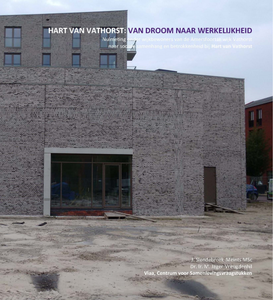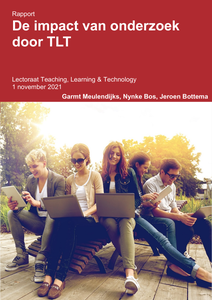Take a break is een zes weken durende innovatieve ambulante interventie die eind 2016 door vrouwenopvang Moviera is ontwikkeld. Doel van het programma is om spanningen en ruzies in relaties en gezinnen in een vroeger stadium te herkennen. Bij de start wordt samen met het gezin een veiligheidsplan opgesteld om de directe veiligheid te realiseren. Met de partners wordt gekeken of een korte time-out noodzakelijk is om te komen tot een veilige situatie en wie van de partners tijdelijk de thuissituatie verlaat. De inzet op het vrijwillig tijdelijk vertrek van een van de partners is een innovatief aspect van deze interventie. Uitgangspunt is dat de kinderen (indien aanwezig) in hun vertrouwde omgeving kunnen blijven en ervaren dat oplossingen mogelijk zijn. Het tweede deel van het traject bestaat uit de analyse van de risico- en beschermende factoren die in dit gezin aanwezig zijn. De analyse wordt afgerond met een Plan van aanpak gericht op duurzame veiligheid in het betreffende gezin en overdracht naar het lokale veld. Aan de hand van een planevaluatie is de werkwijze en theoretische onderbouwing van Take a Break onderzocht.
DOCUMENT

In deze rapportage wordt verslag gedaan van een talentontwikkelingstraject binnen het project Freedom Creators. Freedom Creators is een initiatief van Stichting De Talentstrateeg in samenwerking met jongerenwerkers en jongerenwerkorganisaties in Veendam (Groningen), Harderwijk (Gelderland) en Amsterdam (Noord-Holland).
DOCUMENT

Bij Sport en Bewegen leven verschillende vragen rondom studiesucces. Een van de vragen die de opleiding heeft is gericht op de werking van drempels en de mogelijke invloed daarvan op het aantal langstudeerders. Sport en Bewegen geeft aan dat het lukt om langstudeerders te laten uitstromen, maar doordat er nieuwe langstudeerders bij blijven komen, de totale groep niet afneemt. Een factor die op de instroom van langstudeerders van invloed zou kunnen zijn is de aanwezigheid van drempels in het curriculum. Binnen het programma van Sport en Bewegen zijn er verschillende drempels in het curriculum ingebouwd. Ten eerste zijn er bepaalde eisen waaraan studenten moeten voldoen voordat zij aan de stage in het 3e jaar mogen beginnen. De opleiding biedt de studenten die nog niet met hun stage mogen beginnen de optie om alvast de vakken te volgen die ze anders ná de stage zouden krijgen. Deze vakken worden twee keer in het jaar aangeboden. Een andere optie is dat studenten het 2e jaar opnieuw doen. Door deze twee opties aan te bieden kunnen studenten die nog niet aan hun stage mogen beginnen hun achterstand wegwerken, actief met de studie bezig blijven en blijven ze in contact met de opleiding en klasgenoten
DOCUMENT

Het TEACCH-curriculum (Mesibov, Shea, & Schopler, 2004) beschrijft autisme als een andere cultuur, zoals het de manier bepaalt waarop mensen denken, voelen en zich gedragen. In dit onderzoek heb ik dit vertaald naar ‘de wereld van autisme’. Mensen met autisme hebben ‘vertaling’ nodig om te kunnen begrijpen en begrepen te worden. Ik heb het model van de ijsberg (MCClelland) gebruikt om aan te geven dat ‘niets is wat het lijkt’. Aan het gedrag wat je ziet (de top van de ijsberg) liggen vele oorzaken ten grondslag (onder de waterspiegel). Om een leerling met autisme te kunnen ‘verstaan’, en een aansluiting te kunnen maken waar hij nodig is, moet je onder de waterspiegel kijken. Om professionals in de praktijk op het STIP VSO Utrecht deze vertaling te bieden, ben ik op zoek gegaan naar antwoord op de volgende vraag: Op welke manier kunnen de unieke behoeften, beperkingen en kwaliteiten van elke leerling met autisme en een verstandelijke beperking op het STIP VSO overzichtelijk in beeld gebracht worden, zodat deze informatie toegankelijk is voor de professionals die met deze leerlingen werken? Eén van de uitkomsten van dit onderzoek is de ontwikkeling van een pASSpoort. In de keuze voor relevante aspecten, invulling en vormgeving van dit pASSPoort heb ik, gesteund door een stevig theoretisch kader, praktijkonderzoek gedaan op vier scholen voor (V)SO-ZMLK. Op het STIP VSO Utrecht heb ik het kernteam, de leerkrachten en diverse onderwijsprofessionals, waaronder een aantal ouders van leerlingen met ASS en VB, bevraagd. Het (h)erkennen van de andere wereld, het andere (be)leven, van een leerling met ASS en VB, ondersteund door dit pASSpoort, zal veel over (of onder-)vraging, en hierdoor stress, voorkomen.
DOCUMENT

Dit rapport beschrijft de opzet, resultaten en conclusies van een onderzoek naar het ambitieuze initiatief ‘Hart van Vathorst’: twee zorginstellingen (Sprank en Accolade Zorggroep), een kinderopvang (Bzzzonder) en een kerk (Gereformeerde Kerk vrijgemaakt ‘De Ontmoetingskerk’) die samen één nieuw pand hebben laten bouwen in de nieuwbouwwijk Amersfoort Vathorst. De droom van deze partijen is dat het gezamenlijke gebruik van het pand ertoe leidt dat de kerkgemeenschap, cliënten van de zorgorganisaties en wijkbewoners een zorgzame, inclusieve gemeenschap gaan vormen, met een positief effect op de sociale samenhang in de wijk, en met een positieve rol van de kerk in dat geheel. Met dit onderzoek wordt een nulmeting gegeven van de situatie aan de hand van een schriftelijke enquête onder wijkbewoners en kerkleden. De hoofdvraag van het onderzoek is "Wat zijn effecten van het initiatief Hart van Vathorst, voor betrokken partijen, zoals cliënten, familieleden, professionals, wijkbewoners en kerkleden?"
DOCUMENT

Het lectoraat Teaching, Learning & Technology onderzoekt de didactische inzet van technologie in leerprocessen. Hierbij kijkt het lectoraat naar thema’s als flexibilisering, gepersonaliseerd leren, activerende didactiek en de effecten van de inzet van technologie in de onderwijspraktijk en dan met name het hoger beroepsonderwijs. Wat tot op heden nog niet was onderzocht was of eerder uitgevoerd onderzoek een aantoonbare impact heeft gehad op de onderwijspraktijk. Dit onderzoek is de eerste fase in het inzichtelijk maken van de impact van onderzoek dat het lectoraat Teaching, Learning & Technology (TLT) van hogeschool Inholland heeft uitgevoerd. Er is daarbij gekeken naar onderzoek in de periode 2010 – 2021. De doelstelling is weer te geven hoe in eerder onderzoek beïnvloedbare impactfactoren zijn vormgegeven. Op basis van deze beschrijving kunnen wellicht aanbevelingen worden gedaan aan het lectoraat waarmee de impact van door hen uitgevoerd onderzoek in relatie tot deze factoren, vergroot kan worden. De onderzoeksvraag is: Hoe beschrijven belanghebbenden de impact van door het lectoraat Teaching, Learning & Technology uitgevoerd onderzoek in relatie tot de beïnvloedbare impactfactoren aangaande het onderzoek, de disseminatie en de (ervaren) gebruikswaarde? Voor het beantwoorden van deze onderzoeksvraag maakten we gebruik van een convergent mixed methods design, waarbij een nieuw conceptueel model als basis diende voor de analyse van data uit het praktijkonderzoek. Daarbij hebben we drie typen data verzameld, namelijk een kwalitatieve documentanalyse (N=31), een survey (N=6) en semi-gestructureerde interviews met participanten van de survey (N=4). Uit het onderzoek bleek dat belanghebbenden vooral de onderzoeker aanwijzen als primaire bron van impact. Impact begint en eindigt bij de onderzoeker, vooral in de mate waarin die zich inzet om het onderzoek relevant te maken en te laten aansluiten op vragen vanuit de onderwijspraktijk. Ten aanzien van de wijze waarop impact in toekomstig onderzoek kan worden bewerkstelligd, benoemen we een aantal aandachtspunten. Deze aanbevelingen zijn vooral gericht op de wijze waarop onderzoekers van het lectoraat gestructureerd aandacht kunnen besteden aan de vormgeving van de samenwerking en aan het concreet in beeld brengen van verwachtingen en beoogde impact in een vroegtijdig stadium.
DOCUMENT

In de eerste helft van 2023 heeft het lectoraat Human Capital een onderzoek verricht onder jonge hbo-professionals die afgestudeerd zijn bij de Business en Finance opleidingen van Hogeschool Inholland. We kwamen erachter dat we daar eigenlijk weinig gestructureerde informatie over hebben. Recent systematisch onderzoek naar de attitudes en verwachtingen van jongeren ten opzichte van werk ontbreekt (Wilthagen, 2023). Dit onderzoek kan bijdragen aan meer inzicht hierover, en dan van een specifieke groep jongeren: hbo-professionals in het Business & Finance domein. De resultaten van dit onderzoek bieden inzichten aan werkgevers over wat jonge hbo-professionals beweegt en hoe ze hen aan hun organisatie kunnen binden. Het biedt ook inzicht aan onze studenten: wat kunnen zij verwachten bij hun eerste stappen op de arbeidsmarkt? En tenslotte kunnen we als Hogeschool Inholland de inzichten meenemen in onze curriculumontwikkeling. In een kwalitatief onderzoek zijn we ingegaan op vragen als: Wat komen jonge professionals tegen als ze landen op de arbeidsmarkt? Wat hebben ze, terugkijkend, gehad aan hun opleiding en wat hebben ze pas geleerd op de werkvloer? Wat vinden ze belangrijk aan hun werk en wat aan hun werkgevers? Welke verwachtingen hebben zij met betrekking tot hun loopbaan? En tenslotte, welke verschillen zijn er tussen de verschillende Business & Finance richtingen? Het onderzoek heeft verrassende inzichten opgeleverd, die we in deze publicatie beschrijven.
DOCUMENT
